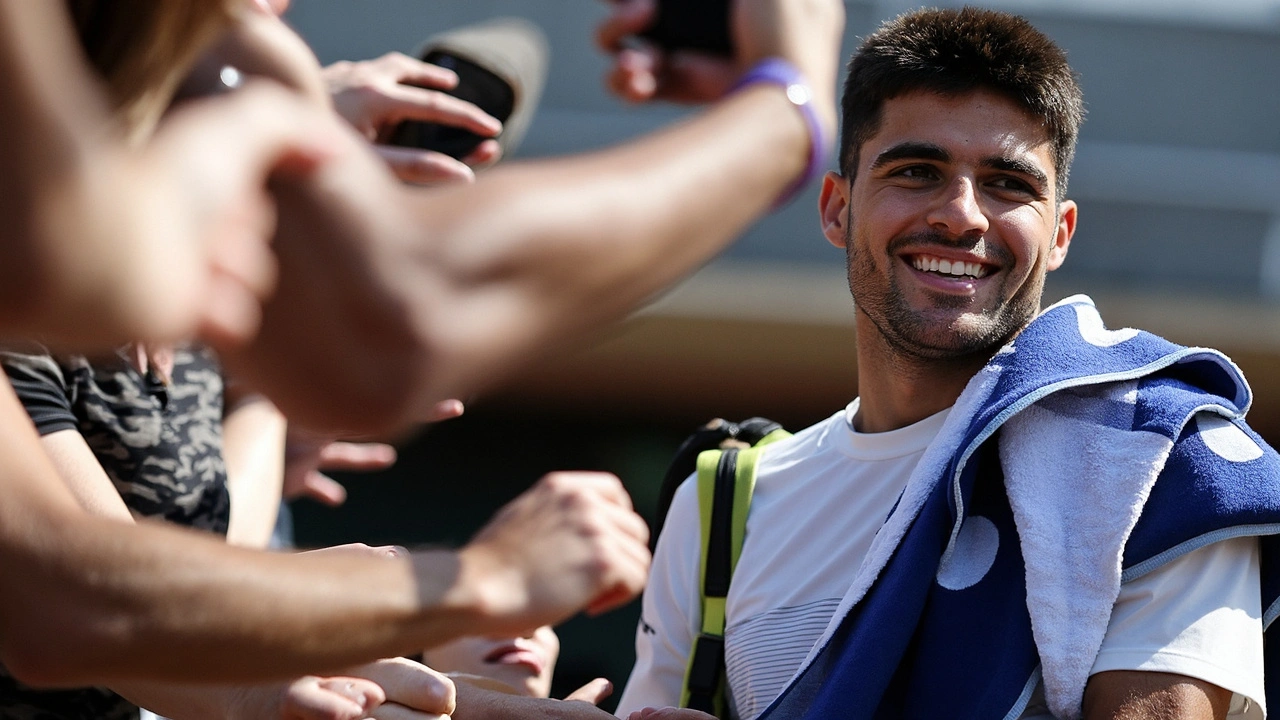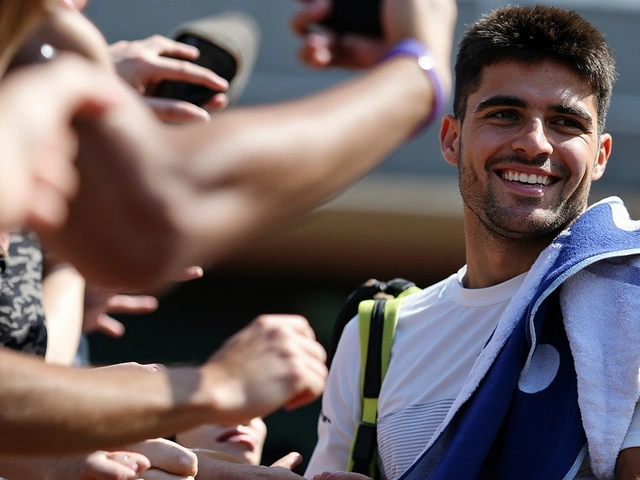Alcaraz’s Journey Hits Netflix—and Rattles Tennis Circles
Even if you’ve only caught the tail end of a Carlos Alcaraz match, you can tell this tennis prodigy plays with fearless energy. But it turns out his life off the court is just as intense as his game. With the recent release of Carlos Alcaraz: My Way on Netflix, we get a rare peek behind the curtain, and the buzz isn’t just about power forehands or trophy lifts.
This three-part documentary, which hit the streaming giant in May 2025, had Alcaraz himself feeling a few nerves. He’d had camera crews shadow him before on Break Point, but this time the spotlight was all his own. There’s vulnerability in telling your story for millions to judge, and Alcaraz admits he lost sleep over how people might react—especially when it came to the episodes capturing raw, sometimes prickly moments with the people closest to him.
Fans and people in the locker room, though, have praised the honesty. In a world where sports documentaries can be all highlight reels and PR, Alcaraz’s willingness to show the tough parts—his doubts, and even team arguments—feels real. The biggest talking point? A tense exchange between Alcaraz and longtime coach Juan Carlos Ferrero, a former world number one who’s helped mold the Spaniard’s game since his teens.
Clashing Perspectives: Partying, Pressure, and Professional Growth
No one expects tennis stars to live like monks, but in Alcaraz’s camp, opinions are split on where the line should be. The documentary zeroes in on a scene where coach Ferrero and Alcaraz’s agent Albert Molina lay it out straight: they’re worried late nights and a busy social life could get in the way of those Grand Slam dreams. For Ferrero, who knows firsthand the sacrifices a championship career demands, seeing his protégé walk the busy line between fun and focus set off alarms. Molina, too, isn’t shy about saying what’s on his mind—in his view, tennis success can be fleeting if distractions pile up.
Alcaraz, for his part, doesn’t dodge the pushback. In fact, he seems to welcome the discomfort if it means living on his own terms. Speaking in interviews after the documentary’s debut, he said he listens closely to Ferrero and his team, but he’s not about to lose himself in people-pleasing. 'I just follow with the things that I want,' he says simply, a mantra for anyone who’s ever felt pressure to fold or compromise.
What makes this story pop isn’t some scandal or staged drama. It’s that Alcaraz, who turned 22 this year and already has a major title to his name, is figuring out what growing up in the public eye really means. He’s proud of the positive reviews and thanks his fans, but when it comes to the handful of critical voices online or in the press, he shrugs them off as 'weird.' For him, it’s only the honest talks with Ferrero, Molina, and his inner circle that actually make a difference.
The back-and-forth over his lifestyle comes at a crucial stage—he’s not just prepping for the Italian Open, but shaping what the next decade of his tennis future will look like. If the documentary says anything, it’s that for all the gold trophies and headlines, Carlos Alcaraz’s biggest fight might be figuring out how to balance ambition with living life his own way.



Comments
Netflix turned his locker room drama into prime‑time binge material.
What we’re really seeing is a clash between the myth of the solitary champion and the messy reality of a twenty‑two‑year‑old trying to own his own narrative.
Alcaraz isn’t just swinging a racket; he’s negotiating identity, fame, and the age‑old expectation that greatness demands sacrifice.
The documentary peels back the glossy veneer exactly where most sports stories choose to hide: the late‑night calls, the whispered doubts, the friction between a coach who lived the grind and a kid who grew up with Instagram’s constant buzz.
Ferrero’s concerns about “late nights” read less like a parental lecture and more like an existential warning that every high‑performer must face when the line between work and play blurs.
Yet Alcaraz’s refusal to be molded into a monk‑like figure is also his most authentic rebellion, a statement that success can coexist with a social life, even if it looks unconventional to the old guard.
In philosophy terms, it’s the classic dialectic of freedom versus determinism, where the athlete’s agency pushes against the deterministic training regimes that have built champions for decades.
He’s not just saying ‘I’ll party,’ he’s asserting ownership over his time, which, bizarrely, is a radical act in a sport that glorifies discipline above all else.
The tension captured on screen isn’t manufactured drama; it’s a genuine negotiation of values, and that’s why it feels raw.
Fans who cheer for his forehand sometimes forget that the same hand is also scrolling through messages, meeting friends, and living a life that isn’t entirely scripted.
By broadcasting those moments, the series invites us to question whether the romanticization of the athlete’s sacrifice is a fair metric for measuring greatness.
If we accept that he can be both a Grand Slam contender and a person with a nightlife, we expand the definition of professionalism itself.
Conversely, ignoring the coach’s perspective risks painting Ferrero as a villain, when he’s simply echoing the lessons learned from his own era of relentless competition.
The real takeaway, then, is the middle ground: a player who listens, learns, and still refuses to surrender his personal joy.
That balance might be the secret sauce that keeps him healthy, both mentally and physically, for the decade ahead.
So when the media latches onto the ‘party’ angle, they’re missing the deeper conversation about autonomy, responsibility, and what it truly means to be a modern champion.
Ferrero’s alarm bells are louder than a stadium crowd because he’s seen careers crumble under the weight of unchecked indulgence.
The doc shows him laying down the law, but also reveals his own fear of being replaced by a generation that values balance.
While Alcaraz pushes back, the underlying truth is that every elite sport has its own culture of sacrifice, and breaking that mold can be both a risk and a rebellion.
The Netflix lens magnifies that tension, turning private disagreements into public spectacle, which can only amplify the pressure on both sides.
In the end, the narrative isn’t about partying; it’s about who gets to write the script of a young star’s destiny.
Watching the footage felt like a soap opera where the hero’s heart is torn between love for the game and love for life.
The coach’s voice echoes like a stern parent, while Alcaraz’s laughter pierces the silence of tradition.
It’s a tempest of emotions that leaves you clutching the edge of your seat, not just for the sport but for the raw humanity spilling out.
This isn’t just tennis; it’s a saga of growing up under a microscope.
Alcaraz’s situation highlights a common challenge for young athletes: balancing performance goals with personal well‑being.
Research in sports psychology suggests that a structured social schedule can actually enhance focus rather than detract from it.
Teams that incorporate mental‑health breaks tend to see longer, more sustainable careers.